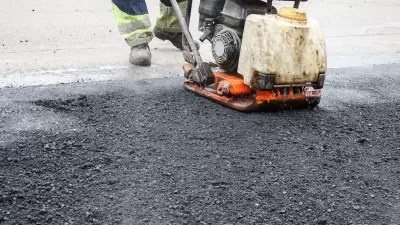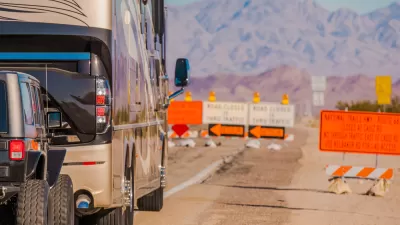The federal government is notorious for putting off road improvements. The good news? If driverless cars become a reality, they can keep putting them off—forever.
In a new paper, Brookings economist Clifford Winston and Purdue professor Fred Mannering point out that driverless cars will render many car-centered technologies, including traffic control systems, obsolete. As a result, the government can save the money it might have spent on improvements. And the public will benefit, too, from fewer crashes and less congestion.
But this doesn’t mean that the government should stop worrying about America’s roadways. “The emergence of a driverless fleet will only draw more attention to the poor condition of America’s roads and its broken transportation funding system,” Eric Jaffe writes. “Try as they might, that’s one problem public officials can’t avoid for too much longer.”
FULL STORY: How Driverless Cars Could Save the Government Lots and Lots of Money

Planetizen Federal Action Tracker
A weekly monitor of how Trump’s orders and actions are impacting planners and planning in America.

Restaurant Patios Were a Pandemic Win — Why Were They so Hard to Keep?
Social distancing requirements and changes in travel patterns prompted cities to pilot new uses for street and sidewalk space. Then it got complicated.

Map: Where Senate Republicans Want to Sell Your Public Lands
For public land advocates, the Senate Republicans’ proposal to sell millions of acres of public land in the West is “the biggest fight of their careers.”

Maui's Vacation Rental Debate Turns Ugly
Verbal attacks, misinformation campaigns and fistfights plague a high-stakes debate to convert thousands of vacation rentals into long-term housing.

San Francisco Suspends Traffic Calming Amidst Record Deaths
Citing “a challenging fiscal landscape,” the city will cease the program on the heels of 42 traffic deaths, including 24 pedestrians.

California Homeless Arrests, Citations Spike After Ruling
An investigation reveals that anti-homeless actions increased up to 500% after Grants Pass v. Johnson — even in cities claiming no policy change.
Urban Design for Planners 1: Software Tools
This six-course series explores essential urban design concepts using open source software and equips planners with the tools they need to participate fully in the urban design process.
Planning for Universal Design
Learn the tools for implementing Universal Design in planning regulations.
Heyer Gruel & Associates PA
JM Goldson LLC
Custer County Colorado
City of Camden Redevelopment Agency
City of Astoria
Transportation Research & Education Center (TREC) at Portland State University
Camden Redevelopment Agency
City of Claremont
Municipality of Princeton (NJ)





























